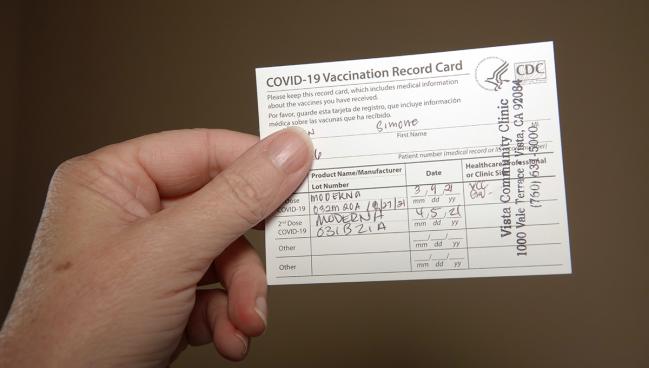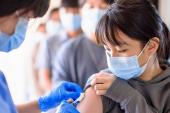In COVID-19 Patients, Vaccination Linked to Lower MACE Risk
Fully vaccinated patients had a 40% lower risk of MACE compared with those who weren’t vaccinated, US registry data show.

Full vaccination against COVID-19 is associated with a significantly lower risk of major adverse cardiovascular events following SARS-CoV-2 infection when compared with not being vaccinated, according to an analysis of US registry data.
Even a partial vaccine regimen appeared to protect against MACE, with these individuals still having a lower risk of major cardiovascular events when compared with those who weren’t vaccinated.
The new study, which was published as a research letter in the Journal of the American College of Cardiology and will be presented at the upcoming American College of Cardiology Scientific Sessions in New Orleans, LA, is in line with research from Korean researchers who showed that full vaccination was associated with a lower risk of MI and ischemic stroke.
“However, the distinguishing strength of our work is that it draws from the largest open US database of COVID-19–positive cases and control subjects, with greater size and racial diversity,” say lead researcher Joy Jiang, BS (Icahn School of Medicine at Mount Sinai, New York), and colleagues. “We also investigated partial vaccination and included Johnson and Johnson vaccines, where previous work considered mRNA [vaccines] only.”
In an email to TCTMD, Jiang said that while COVID-19 vaccination has been linked to myocarditis and cardiovascular events, the event rates are low and the risk is mostly limited to certain age groups, such as young males being more susceptible to myocarditis after mRNA vaccination. Despite those risks, the rates of cardiac events after COVID-19 infection are much higher than after vaccination, said Jiang.
“At least from the perspective of this study, we capture one benefit of vaccination in that there is an association with reduced risk of MACE as shown in previous large studies,” she said.
Specific Subgroups at Elevated Risk
The new study included 1,934,294 patients (mean age 45.2 years; 55.9% women) infected with SARS-CoV-2 between March 2020 and February 2022 who were included in the National COVID Cohort Collaborative (N3C). Of these, 10.1% were fully vaccinated and 1.2% were partially vaccinated. Full vaccination was defined two or more mRNA vaccines (Pfizer/BioNTech or Moderna) or a single viral-vector vaccine (Johnson & Johnson) within 2 weeks of SARS-CoV-2 infection.
Overall, MACE occurred in 13,948 patients, including 12,733 events among the unvaccinated, 160 events in the partially vaccinated, and 1,055 in the fully vaccinated. The median time to MACE after infection was 17 days. Those who had a major cardiac event following SARS-CoV-2 infection were more likely to have had a previous MACE and to have type 2 diabetes, elevated lipid levels, ischemic heart disease, liver disease, and obesity when compared with those who didn’t have events.
In an adjusted Cox proportional hazards model, full vaccination was associated with a 41% lower risk of MACE in the 6 months after infection when compared no vaccination (adjusted HR 0.59; 95 CI 0.55-0.63). Similarly, those who were partially vaccinated also had a lower risk of MACE compared with the unvaccinated patients (adjusted HR; 0.76; 95% CI 0.65-0.89).
Males; older people, especially those 66 years and above; and those with comorbidities, particularly prior MACE, were at a significantly increased risk of MACE after SARS-CoV-2 infection.
Speaking to the low vaccination rates seen in the study, Jiang said there are a few reasons why it’s lower than that seen in other publicly available vaccine-tracking data. Vaccine types were limited to those most widely distributed, while full and partial vaccination status was limited to specific time intervals relative to infection, she said. “Finally, vaccinations entered into patient electronic health records are those that are recorded to the N3C database, and there may have been a lag in recording between receiving a vaccine and having that registered in EHR,” said Jiang.
Like all observational studies, Jiang said there are limitations to their analysis, noting that unmeasured confounding is a possibility. The decision to vaccinate is influenced by factors that could also influence cardiovascular health, such as education level and socioeconomic characteristics, she noted.
Michael O’Riordan is the Managing Editor for TCTMD. He completed his undergraduate degrees at Queen’s University in Kingston, ON, and…
Read Full BioSources
Jiang J, Chan L, Kauffman J, et al. Impact of vaccination on major adverse cardiovascular events in patients with COVID-19 infection. J Am Coll Cardiol. 2023;Epub ahead of print.
Disclosures
- Jiang reports no relevant conflicts of interest.





Comments